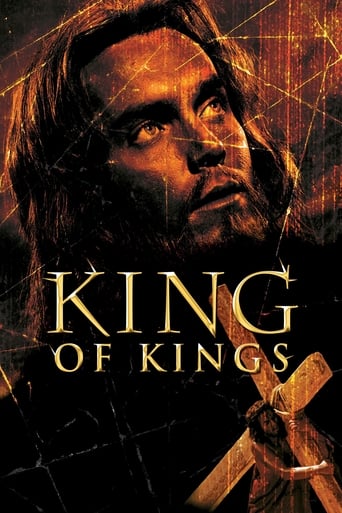chitown_babe
Before other movies depicting the life of Christ, this was always my favorite. In my opinion, the best depiction of Christ's life was and still is the made for TV series, "Jesus of Nazareth". Robert Powell was a little "soap opera-ish" but overall he did a good job. There are many biblical errors in this version--mostly stressing the Protestant version of the Bible, but again, those were easily ignored. I thought the Magi were the BEST ever--especially Donald Pleasance. James Earl Jones wasn't bad either. Fernando Ray (Rey?) was also great! Today, my favorite religious movie is "The Passion of the Christ". There is no other biblical movie to date that can outdo this perfect depiction of the last three days of Jesus' life. Mel Gibson has his problems, but this movie is his shining accomplishment. (Apocalyto was awesome, too!)
ovcharenko
I agree that this is one of the best, if not the best depiction of Jesus' life. I am not as enchanted by the actor as many others seem to be, but what is appealing about him are the lines he delivers, wonderful wisdom from the Bible itself (or the Jesus Seminar version of it). But absolutely the most compelling figure in this film is Lucius -- in fact, I would argue that it could rightfully be called "The Conversion of Lucius".
don2507
I own A DVD of this film and try to watch it at Easter time about every second or third year. In my view, it's the best and most reverent depiction of Christ's life that I've seen with a wonderful score by Miklos Rozsa and excellent production values associated with the epics of the famous producer Samuel Bronston (El Cid, Fall of the Roman Empire). Moreover, Orson Welles' splendid narration conveys the right amount of solemnity and descriptiveness.I'm well aware that King of Kings was largely panned by critics when first released, and although it has gained much in stature in recent decades, it still has its share of critics. Much of that criticism seems to be based on the blue-eyed, heartthrob Jeffrey Hunter playing Jesus in the film, and it was reported that he was selected for the positive effect his looks would have on the box office. But he's grown on me; he has a very rich and charismatic voice and a penetrating stare that conveys an other-worldly look ("my kingdom is not of this world"). His performance in the Sermon on the Mount is commanding and when asked "teach us to pray", his recitation of the Lord's Prayer is soaring and emotional. There's sympathy in his depiction of Jesus: "woman, where are they that condemn you?"; there's steadfastness: "do not tempt the Lord thy God! (to Satan in the wilderness), there's fear: "take this cup from me!" and then there's inscrutable resignation: no responses to Pilate's "art thou a God?" The doctrine of the Incarnation must make playing Christ extremely difficult as you must convey divine attributes and very human emotions.For my money, the best scenes for staging, visual and sound / musical effects, reverence, and spiritual depth and intensity are the aforementioned Sermon on the Mount, the temptations in the wilderness, Jesus' the extinction on the cross followed by dark clouds and rushing wind and the final acknowledgment of God's presence by the cynical centurion, and finally the off-camera presence revealed by a lengthening shadow of Christ's final admonition to the disciples at the Sea of Galilee to "go and make disciples of all nations" amid the soaring music of Rozas. Very inspiring moments! My one criticism, and I thought of knocking the rating down to a 9 because of this but did not, was the over-emphasis on Barabbas and his mission to violently oppose the Romans and free Judea. Barabbas was interested in political freedom. Compare this to Jesus who tells the guards of John the Baptist, who remains in his dungeon, that "I've come to free John from within himself." I suspect the minutes of the film given to Barabbas and his cohort were an excuse to provide several superfluous battle scenes with the Romans, add some unneeded "action" and attract younger audiences. Jesus is not El Cid!
tieman64
Personalities clash in "King of Kings". On one hand you have director Nicholas Ray, renowned for a number of excellent, low key psychodramas. On the other you have producer Samuel Bronston, a man obsessed with excess, money and spectacle ("The Fall of the Roman Empire", "El Cid" etc). Their contrasting tendencies shape 1961's "King of Kings", a stiff, overly lavish recounting of the New Testament, which nevertheless displays faint traces of Ray's customary sensitivity.Like the hero of his earlier film, "Rebel Without a Cause", Ray's Jesus Christ is a deeply conflicted young man. Yes, the film touches upon all the usual Biblical cornerstones - Christ's birth in Bethlehem, the prophecies of John the Baptist, the 40-day ordeal in the desert, the selection of the Apostles, the Sermon on the Mount, Judas' betrayal of Jesus, the Passion, the Crucifixion, the Resurrection, the Ascension etc – but also paints Jesus as a guy unsure of how to lead his people. In this regard, Ray contrasts Jesus with the Biblical figure of Barabbas (Harry Guardino). Here Barabbas is portrayed as a proto-Zionist nationalist hell bent on "saving" Jews from the oppressive power of Rome. Jesus is then offered as an "alternative" to Barabbas. Where Barabbas is a firebrand radical in love with violent revolt, Jesus is a figure of peaceful resistance and, he hopes, long-lasting liberation.Though mildly interesting, Ray's take on Christ can't compete with the best Jesus movies (Passolini, Rossellini etc). As played by Jeffrey Hunter, Ray's Jesus is also mostly creepy, with beady eyes, overly pretty features and fake facial hair. He's more paedophile serial killer than son of God. The film also boasts a cast of thousands, bright Technicolor footage and over 400 sets, but it's all wasted decor.Ray was an atheist (and an early member of the left-wing "Theatre of Action" group), so you'd think he'd find a film about Christ off-putting. But atheists tend to make the best "spiritual" movies. Indeed, during this period you had a number of lefty atheists churning out Bible flicks, from Passolini all the way down to John Huston. Why the attraction? Maybe because Jesus laid the smack-down on corrupt money changers, sided with society's excluded, ran his own free-at-the-point of delivery health service, stuck two fingers up at established religion, dished out food to the masses, rescued women from the death penalty, promised a caring society for the under-privileged and then, as a freebie, got everyone stoned at a wedding. The result? An elitist conspiracy, a show-trial on trumped-up charges and execution. In other words, your typical lefty hero. Until "religion" got a hold of the story.Ray would collaborate again with Bronston on "55 Days at Peking", another lavish epic. That film all but destroyed his career, leaving the poor guy in a lonely place, until Wim Wenders reached out a helping hand. Wenders was a fervent Christian. God bless him. Ray could be a grump.6/10 – Worth one viewing.




